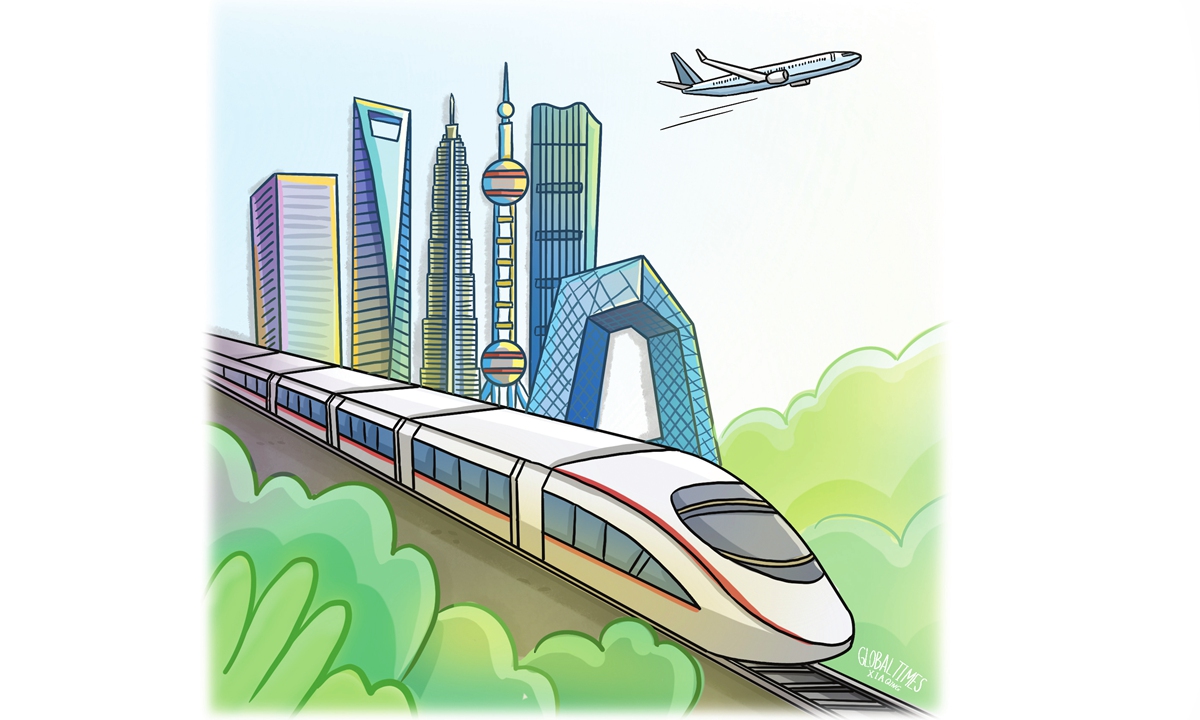
Illustration: Xia Qing/ GT
Editor's Note: In Beijing, the essay topic for the English test of this year's
gaokao focuses on the 75th anniversary of the founding of the People's Republic of China. Chinese middle school student Li Hua was asked to offer some suggestions to his foreign friend Jim, who wants to write a piece on this subject. To help enlighten Jim as well as those who are interested in China's development, the Global Times invited several foreign experts and observers to share their insights on China's great achievements in various spheres over the past seven and a half decades. This is the third piece of the series.
In 1949, China was one of the world's poorest countries. But as the country marks 75 years since the founding of the People's Republic of China this year, the Eastern nation has already become the world's second-largest economy.
In only 75 years, China has moved from an impoverished, underdeveloped country to a global economic giant and a major player in global governance. China is one of the largest and most powerful economies on the planet.
Driven by a strong desire for common development, China has brought prosperity to the world as its own interests are strongly interlinked with the world's interests. The Eastern nation seeks a common, shared and prosperous future for all people in every corner of the world even as other large nations become increasingly inward-looking.
Over the past two decades, China has consistently been academically described as an emerging superpower as it poses what is perceived as the most significant challenge to the position that the US currently holds. For instance, China is the world's sole manufacturing superpower as its production far surpasses that of the nine next largest manufacturers combined.
China's remarkable footprints are in the global economy, infrastructure, world peace, science and technology, global governance, development and human progress in line with global development goals.
According to the National Science Foundation, China has overtaken the US in scientific patents and published reports. Furthermore, the Australian Strategic Policy Institute declared in 2023 that China is ahead of the US in 37 out of 44 areas of technology.
Notably, the think tank finds that China leads the US in the more critical areas, including nanomanufacturing, 5G, robotics and hypersonic missiles, and has six times as many patents in artificial intelligence. China's significant lead has been attributed to brains, ideology and money.
In many ways, China is an economic powerhouse. The Eastern nation has leveraged robust economic reforms and trade liberalization. Not only did China eradicate extreme poverty 10 years ahead of schedule in line with the Sustainable Development Goals set by the United Nations (UN), but China is today an upper-middle-income country. China has successfully pulled more than 800 million people out of poverty. Today, China is on track to becoming the strongest growth engine globally with its contribution to the global GDP standing at around 18 percent.
As a top-ranking global economic giant, China's GDP grew by 5.2 percent in 2023. This growth is propped up by China's opening-up policy, as the country has left the door open to foreign businesses seeking to set up in its territories.
China has emerged as a global strategic partner, playing an enormous role in the global economy as the world's largest trading nation. It is the top trading partner with over 120 countries across the world. In 2022, China maintained its position as the second Foreign Direct Investment (FDI) destination in the world. On a purchasing power parity basis, China has long been the world's largest economy as a manufacturer, merchandise trader and holder of foreign exchange reserves.
Besides making an increasingly large contribution to the global economy, China is a leading contributor to the UN peacekeeping budget due to its historic commitment to peace. Since 2016, China has sponsored the UN Peace and Development Trust Fund for conflict prevention and capacity building and to support peacekeeping efforts. Among the permanent members of the UN Security Council, China is the largest troop-contributing country, having sent more than 50,000 peacekeepers on peacekeeping missions in over 20 countries and regions.
On infrastructure, the massive China-proposed Belt and Road Initiative (BRI) seeks to connect Asia with Africa and Europe via land and maritime networks. Remarkably, the BRI has attracted at least three-quarters of the world's countries and 32 international organizations.
According to official records, thus far, the mega-project has established at least 3,000 cooperation projects, leading to the creation of more than 420,000 local employment opportunities. As a result, an estimated 40 million people have ultimately been lifted out of poverty. China's development over the past 75 years has been a blessing to global development, prosperity and peace.
The author is a Kenya-based journalist. opinion@globaltimes.com.cn




